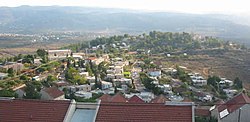Elon Moreh
|
Elon Moreh אֵלוֹן מוֹרֶה |
|
|---|---|
| Hebrew transcription(s) | |
| • unofficial | Elon More |

The two older neighbourhoods, looking south
|
|
| Coordinates: 32°14′2.15″N 35°19′52.69″E / 32.2339306°N 35.3313028°ECoordinates: 32°14′2.15″N 35°19′52.69″E / 32.2339306°N 35.3313028°E | |
| District | Judea and Samaria Area |
| Council | Shomron |
| Region | West Bank |
| Affiliation | Amana |
| Founded | 1980 |
| Population (2015) | 1,794 |
| Name meaning | Named after Biblical town |
Elon Moreh (Hebrew: אֵלוֹן מוֹרֶה) is an Israeli settlement in the West Bank. Located in the Samarian hills northeast of Nablus on the slopes of the Mount Kabir ridge, it falls under the jurisdiction of Shomron Regional Council. In 2015, it had a population of 1,794.
The international community considers Israeli settlements in the West Bank illegal under international law, but the Israeli government disputes this.
The history of the modern settlement named for Biblical Elon Moreh started in the mid-1970s, when a group led by Rabbi Menachem Felix and Benny Katzover organized a pioneering group of dozens of families called Garin Elon Moreh in order to found a settlement in the Shechem area. Eight times, the group tried to choose a plot of land to settle, but the Israeli government under Yitzchak Rabin, then in his first term, prevented these attempts - arguing that the settlers' main aim was to secure permanent Israeli possession of the territory, and that such possession would preclude any possibility of peace with Jordan, or a Palestinian state. However, Shimon Peres - then-Defence Minister - was accused of clandestinely helping the settlers as part of his ongoing power struggle with Rabin.
In 1975, after a controversial attempt to settle the area of Sebastia, the group was finally allowed to stay in the area by taking up residence on an army base called Kadum eleven kilometers west of Shechem, with the families living in an abandoned prison. In 1979, the government under Menachem Begin allowed them to take up residence south of Nablus, but an injunction by the Israeli Supreme Court stopped the plan, ruling that that land belonged to local Arabs, and that the army had power to confiscate land only for pure military purposes, and not for civilian settlement of Israelis.
...
Wikipedia

